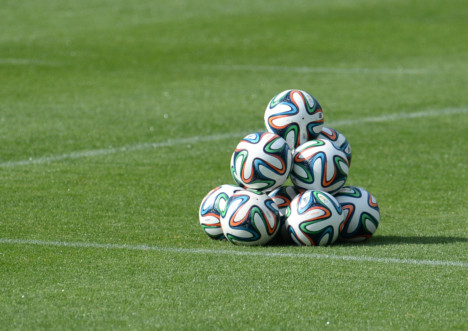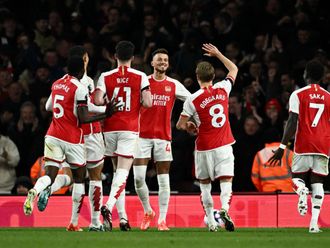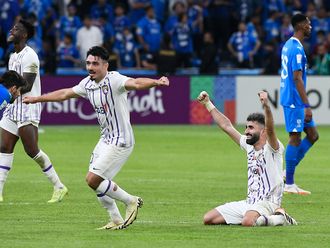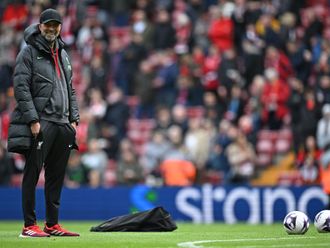
The Fifa World Cup is the apotheosis of football because it seperates the great from the good. The inherently unpredictable and captivating nature of sport and football are nowhere better showcased than every four years at the Fifa World Cup.
The World Cup does not just demand the best footballers are capable of giving. It demands that they produce their best at a given time. You have to be good on that day. Then, right then. Or never. The ultimate carpe diem. If you don’t, you’ll have to wait another four years — if you get selected again. Until then you will always be regarded as being just another one with potential.
The ability to seize rare moments such as World Cup Finals is inextricably linked to greatness. It’s the reason why the likes of Pelé, Bobby Moore and Diego Maradona are listed in the chronicles of football’s all-time greats. It’s also why Lionel Messi and Cristiano Ronaldo are not yet permitted that epithet of ultimate distinction. Neither has led their side to World Cup glory. Yet.
The great don’t need a lucky draw. The great don’t capitulate under pressure. And the great are never really underdogs in the true sense of the word. Although greatness does lie within the lucky, the flops and the underdogs, it is bound-up in the narrative that these performers create.
But that’s not to say that these teams should be ignored or dismissed as entertaining additions to the real action produced by the likely and eventual winners. They are the current that carries the story of a World Cup to its conclusion.
South Korea shocked the footballing world in 2002 by beating Italy and Spain. Their narrative of home-grown underdogs was undoubtedly great. When Cameroon pulled off a 1-0 victory over Maradona’s wondrous Argentina — albeit through rather questionable tactics — at Italia 90, it was a great moment.
When France failed to progress through the Group stages of the 2002 World Cup, having lifted the trophy in 1998, it was a great moment — in ignominy.
Diego Maradona’s mid-tournament ban for taking illegal, performance-enhancing drugs, Zidane’s headbutt, Escobar’s tragic own goal — all shocking, but undoubtedly great moments that make up the World Cup tableaux.
Sometimes, when the World Cup rolls around, it’s better to be lucky than good. Take Sweden’s campaign in 1994. Apart from Brazil being in their group, they faced Russia, Cameroon and Saudi Arabia in the Round of 16, Romania in the quarter-finals before being knocked out by Brazil in the semis. Sweden finished third after destroying Bulgaria 4-0 in the third place play-off. A fortunately easy ride for the Swedes in football’s toughest competition saw them come away with third place. But it’s another great story.
The narratives of bygone World Cups have almost always produced identifiable categories: winners, shockers, surprise packages and lucky ones. The GN Focus team has sifted through the teams in Brazil this year to identify who falls into these categories and what to expect from them. Greatness, despair, agony and ecstasy await each team’s story.
Surprise packages
Ivory Coast
A big, powerful outfit full of English Premier League stars earmarks the Ivorians as a team to upset some big boys in Brazil this year. Along with Nigeria, Les Elephants were the only African side to qualify unbeaten. Despite having been accused of a lethargic indifference on the pitch, they came back from losing positions to claim points in more than half of their qualifying matches, scoring in every match along the way.
Given the talents of the ageing, but still lethal Galatasary and former Chelsea star Didier Drogba, Swansea’s Wilfried Bony and Manchester City’s midfield general and powerhouse Yaya Toure, their goal threat is always imminent. And look out for 20-year-old Toulouse right-back Serge Aurier. He’s a flier.
Being handed an easier grouping this year (Japan, Greece and Colombia), having been landed with Brazil and Portugal in 2010 and Argentina and the Netherlands in 2006, 2014 could be the year Drogba and co. deliver. If they can resist complacency. The test for Ivory Coast will be keeping opponents at bay and playing as a team — the handful of brilliant individuals tends to gloss over the average members of the squad.
Bosnia And Herzegovina
This year will see Bosnia and Herzegovina make their World Cup Finals debut. And it could be a case of beginner’s luck for the Balkan side. Despite sharing Group F with the much-fancied Argentina, they face two sides they will be confident of getting positive results against: Iran and Nigeria.
Considering Iran’s unenviable World Cup record of never progressing from the group stages, the second place spot will be decided by the clash between Nigeria and Bosnia (June 21), where the Nigerians are the favourites, but Bosnia have enough firepower to overcome the Africans. Don’t be surprised if they do.
Their recent form is encouraging. The Bosnians scored 30 goals and won eight out of their ten qualification matches. Star striker and Vice-Captain Edin Džeko is in the form of his life, having scored vital goals for club side Manchester City at the tail end of the English Premier League, which took the Etihad-owned club to its second league title in three years. Then there’s Asmir Begovic between the sticks, whose consistency for Stoke City won him a lot of plaudits in the 2013-14 season.
AS Roma’s creative midfielder Miralem Pjanic and Stuttgart’s Vedad Ibisevic — a suitable strike partner for Džeko with 18 goals scored between them during the qualifications leading to Brazil — provide other attacking threats that could see Bosnia do unexpectedly well. A Round of 16 meeting with France would be a fascinating game for the purist.
Japan
The Japanese slogan for the World Cup says it all: Samurai, the time has come to fight! While it may lack the oratory fluency of a Horace-like motivational speech, the sentiment is pretty good.
This is the Samurai Blue’s best chance of advancing past the Round of 16 yet. They enter Brazil with optimistic spirits and a realistic chance of doing well. Japan is the best side in Asia by a distance and being drawn in a Group C lacking footballing heavyweights, Italian manager Alberto Zaccheroni will be confident his side can spring a surprise.
Manchester United’s Shinji Kagawa is very much at home in the central attacking midfield role he occupies for Japan, while Sjinki Okazaki has enjoyed a stellar year with German side FZV Mainz 05, becoming the highestscoring Japanese player (with 14) in Bundesliga history.
The Greeks’ vulnerability in the air will play into Japanese hands — Zaccheroni’s side scored 30 per cent of their goals from headers in qualifying (the seventh-highest of all 32 finalists). And Colombia and Ivory Coast’s shaky defences could be tested by the blue’s industrialism around the box.
Ghana
The Black Stars are our dark horses in the Group of Death, and possibly beyond. Many have already written off James Appiah’s chances of conjuring another World Cup miracle. Bloomberg Sport has even gone as far as to say that they will finish 25th out of the 32 teams in the competition — not sure how they’ve worked that out.
But there is hope for the Ghanaians. Though their defensive frailties may well be their undoing, their attacking force has proven potency, averaging 3.13 goals per game in qualifying. Al Ain’s own Asamoah Gyan will undoubtedly be the spearhead of any forward momentum and he will be suitably provided for by Schalke 04’s Kevin-Prince Boateng — both of whom shone in South Africa four years ago.
Against the USA and Portugal there is hope. Both teams are vulnerable from set pieces, which Ghana will look to exploit with their power in the air through good-quality service from the boot of Boateng. We’re not saying they will definitely defy the odds and magically finish second in the Group of Death, but they just might. Stranger things have happened in the World Cup.
Lucky ones
Belgium
Belgium’s mascot — Benelucky the Lion — just about sums it up for the Belgians heading to Brazil. It’s hard to choose a luckier team in this World Cup than Belgium. With Algeria, Russia and South Korea merely keeping them company and filling in the spots in Group H, the Belgians are favourites to proceed to the Round of 16, where, should they win their group, they would face the runners-up of Group G, which GN Focus predicts will be Portugal or Ghana.
The immensely talented Red Devils should hold their own against their next opponents, and a quarter-final appearance is where the competition will really start hotting up for them.
The Belgium team consists of youngsters who have proven themselves as integral additions to their respective European clubs — Eden Hazard at Chelsea, Romelu Lukaku at Everton, Adnan Januzaj at Manchester United and Thibaut Courtois at Atletico Madrid. The experience of Captain Vincent Kompany, Thomas Vermaelen and Jan Vertonghen, who are stars in their own right, provides a much-needed solid framework from which the flamboyance of Belgium’s youngsters can dazzle.
France
This World Cup could be France’s best chance at success after eight long years of Les Miserablesesque performances. Ever since Zinedine Zidane retired, the French have struggled to replace the creative hole left in Les Bleus’ midfield.
Having crashed out of the 2010 World Cup after failing to progress through the group stages, France will be counting their blessings, as this year’s draw means they have to battle teams that arrive in Brazil with low expectations — Switzerland, Ecuador and Honduras. A slightly easier task than in South Africa.
The current squad might not have the calibre of the class of 1998 (Zinedine Zidane, Claude Makelele, Patrick Vieira, Lilian Thuram and Thierry Henry), but it does possess the talents of Mathieu Valbuena, Loic Remy, Jeremy Ménez, Karim Benzema and Moussa Sissoko.
If Group D (Uruguay, Costa Rica, England and Italy) is the group of death, France’s Group E can be a group of life. Vive le France.
Argentina
If Argentina are to taste World Cup glory for the first time since 1986, the Albicelestes won’t have a better chance than in Brazil this year. Being drawn in Group F along with Nigeria, Bosnia and Herzegovina and Iran, Alejandro Sabella must be thanking the gods for three games that he can use to get his side’s feet used to the turf.
Interestingly, no team has outscored Argentina in the 2014 World Cup qualification process from central positions. About 77 per cent of Argentina’s goals came from central areas, which isn’t surprising given their focus on Aguero, Messi and Higuain.
But here’s where they’re lucky in this respect — Nigeria, Bosnia and Iran are all deficient in defending attacks from central positions.
Argentina’s group games will thus allow them to hone their attacking strengths. Beyond the group stages, the Argentines, when they finish first, will face the runner-up of Group E, which we say is likely to be Ecuador (no match for Messi and co.) and then Belgium in the quarterfinals (a more talented side, but still no match for Argentina). Their first real test will come against the Germans in the semi-finals.
Colombia
Colombia share Group C with the Ivory Coast, Japan and Greece. And if/when they pass the group stages, they will need a miracle, as they would then play England, Italy or Uruguay. With Radamel Falcao out of the tournament with an injury, Jackson Martinez, the FC Porto striker, who can bank on attacking midfielders Juan Guillermo Cuadrado (Fiorentina) and James Rodriguez (Monaco), will fill in.
Colombia also have the best wing backs, Napoli’s Juan Zuniga and Pablo Armero. Colombia finished second after Argentina in the South American qualifiers and has the advantage of playing in its home continent.
The winners
Brazil
Playing in their own backyard, the five-time World Cup winners are clear favourites for the 2014 tournament. And as with every World Cup, Brazil’s burden of expectations is placed on young shoulders.
The current crop are pacier than the Selecao side that reached the quarter-finals in South Africa, and possess real ingenuity in the boots of home-grown Barcelona superstar Neymar Jr, rock-like solidity at the back with PSG’s Thiago Silva and pace to burn in Marcelo and Dani Alves — of Real Madrid and Barcelona respectively — on the flanks.
But the question remains — will the most famous team in international football step up to the plate on their own turf, or buckle under the weight of expectations?
Spain
With two European championships sandwiching their maiden World Cup win in 2010, the question with this team really has to be: will they ever tire of winning? With each of these triumphs, the star-studded Spanish side has moved away from the swashbuckling style that won neutrals over six years ago to a more conservative but no-less-deadly game based heavily on the counter.
La Furia’s impressive defensive record of only three goals conceded in qualification shows they have one of the sturdiest back lines in the game right now. And in Barcelona’s Pedro, pass magicians Xavi and Cesc Fabregas have a target to aim for.
While coach Del Bosque got away with playing the latter as a false 9 at Euro 2012, with all due respect to the much-maligned Fernando Torres, the addition of Atletico Madrid’s Diego Costa brings some muscle, heart and drive to a team lacking an explosive presence up front.
Although they will miss the ferocious drive and commitment of Carlos Puyol, Spain has a highly experienced back two of Gerard Pique and Sergio Ramos, and the pair is flanked by the pacey Jordi Alba and Atletico’s Juanfran. Ramos’s longtime teammate Iker Casillas will return between the posts.
It’s astounding that Spain were regarded as non-entities at the highest level just eight years ago.
Germany
A squad brimming with the best of Bayern Munich, Borussia Dortmund and a few Premier League superstars, Germany have undoubtedly got the skill — and legendary mental reserve — to claim the trophy for a fourth time.
The Germans’ rampaging scoring crusades in qualifying saw them notch up an average of 3.6 goals per game and will be a concern for opponents. They didn’t fail to score less than twice in ten games.
The German squad has interesting contrasts, with Duracell bunny Thomas Muller, the languid but visionary Mesut Ozil and organisational totem pole Per Mertasacker. Veteran front man Miroslav Klose is also hoping to surpass (classic) Ronaldo’s World Cup scoring record of 15. On the other end of the pitch, Bayern’s Manuel Neuer is among the world’s finest between the posts.
Germany also retain the experience and nous of 105-capped Philipp Lahm, who can play on either side as a full back, as well as at the base of the Teutonic midfield behind Toni Kroos and Bastian Schweinsteiger. Die Mannschaft will stand tall.
Argentina
And here they are again. An enigma wrapped up in the magic of three-time World Player of the Year Lionel Messi (pictured). No one is quite sure how this Argentina side will fare in Brazil. But one thing is certain, if Messi brings his Ballon D’or winning boots with him, they could just be unstoppable.
Despite an embarrassment of riches up front — besides Messi, the Argentines also have Paris Saint Germain’s Ezequel Lavezzi, two-time Premier League Champion Sergio Aguero and the golazo-scoring Gonzalo Higuain of Napoli — the rest of Alejandro Sabella’s squad does lack a bit of stardust.
As displayed for years at Liverpool and then Barcelona, Javier Mascherano is a tough tackler capable of mixing it up with the best, while streetwise Pablo Zabaleta has made the rightback slot his own at Manchester City.
But the back four are mostly unproven at the highest levels, although with most of them plying their trade in the South American continent, the weather will give them an advantage over the favoured European teams.
The shockers
England
Overhype and grand expectations once again follow England to the World Cup. Every four years, English football fans become convinced that the Three Lions will repeat their 1966 success. There is no evidence in recent memory to suggest this is based on sound logic.
England’s big-game players inevitably fail to flourish and don’t expect Brazil 2014 to be any different. The South American climate will sap England’s midfielders of their creativity, strikers of their pace and defenders of their composure. Being drawn in a tough group alongside outside favourites Uruguay and reliably efficient World Cup performers Italy has not helped England’s cause. There’s even an argument that they will do well to beat a well-acclimatised Costa Rica side.
Roy Hodgson has selected England’s second youngest squad ever, with an average age of 26. He will be hoping the wet ears of Steven Gerrard and Frank Lampard, who’ve both won more than 100 caps for their country, and Manchester United striker Wayne Rooney (89 caps) will be able to guide the young guns through.
England’s most encouraging signs come from the same realm as Stevie Wonder, black cats and broken mirrors: in 1966, Austria won the Eurovision song contest, Real Madrid won the Champions League, Atletico Madrid won La Liga, Fulham were relegated, and it was the last year a side rallied from 2-0 down in an FA Cup Final to win. And England won the World Cup. The same sequence has unfolded in 2014 so far. The World Cup awaits.
The Netherlands
Newly appointed Manchester United boss Luis Van Gaal has his work cut out this summer before joining the Red Devils. Drawn with 2010 World Cup Winners Spain, the Dutch, despite boasting a fearsome attack in Robin van Persie, Wesley Sneider and Arjen Robben, could well be one of the tournament’s big flops.
The 2010 World Cup final notwithstanding, recent tournament form suggests The Netherlands will do well to qualify from Group B, which also features South American sides Chile and Ecuador.
If Van Gaal’s men do progress to the Round of 16, behind Spain in second place in all likelihood, they will almost certainly meet Brazil in the knockout stages, which the latter will be favourites to win.
Anything but a semi-final berth in Brazil will be adjudged a failure for the 2010 runners-up.
Portugal
A one-man team. Albeit the one man, Real Madrid’s Cristiano Ronaldo, is the world’s best footballer at the moment. But the Selecção das Quinas are in a tough group, despite having talented players such as AS Monaco’s Joao Moutinho and Real Madrid’s Pepe and Fabio Coentrao. Already playing second fiddle to a strong German side in Group G, should Paulo Bento’s men manage to beat the powerful Ghanaians (which could be one of the best matches of the group stages) and the US (who proved they can upset the big boys with a 1-1 draw with England in South Africa in 2010) to progress to the Round of 16, they are likely to meet Belgium.
Portugal’s route to the World Cup is a good measure of where they stand. They finished behind Russia in qualifying and eventually snuck into the tournament in Brazil thanks to four goals from Ballon d’Or winner Ronaldo to overcome Sweden 4-2 in a qualification play-off. Should he not carry his team past the group stages, it would be one of the tournament’s biggest, but not unlikeliest, of upsets.
Russia
Under experienced former England head coach Fabio Capello, you would expect the Russians to not only progress from an easy but deceptive Group H (Belgium, South Korea and Algeria) but to do well in the knock-out phases.
But pained England fans will recollect Capello’s frustrating penchant for doing the minimum required, which on more than one occasion bred a lackadaisical approach, which opponents exploited with regular glee. This particular Capello characteristic could well be the undoing of the Eastern Bloc’s powerhouse in Brazil.
Unaccustomed to South American climes, Russia could fall at the group stages. The South Koreans can be quite a handful, and their energy levels could just tip the important clash with the Russians in their favour come June 17 in Cuiaba.









